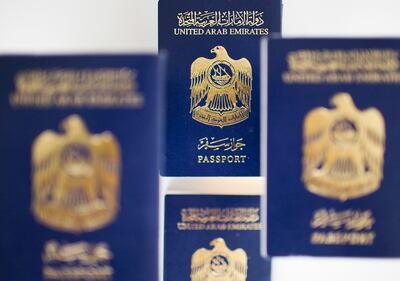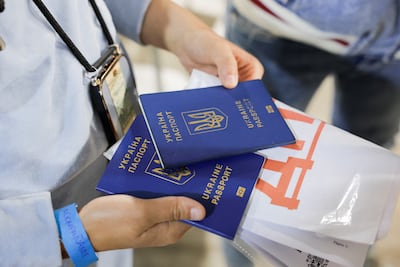The release of the latest Henley Passport Index details the UAE as the Covid-19 winner.
The study, which ranks the world’s passports according to the number of destinations their holders can access without obtaining a prior visa, is compiled using official data from the International Air Transport Association.
Over the past two years, as the world has battled the pandemic, the UAE passport has remained strong.

In the latest ranking, the UAE retains its position at No 15, the highest spot it has achieved since the launch of the index in 2006. It shares the ranking with Cyprus.
Emirati travellers are now able to visit 176 countries around the world on either a visa-free or visa-on-arrival basis. The index shows the UAE is also the biggest climber of the last decade, having gained 49 places from a ranking of No 64 in 2012.
The UAE is also the only Arab nation to rank in the top 20.
World's most powerful passports lack freedom to travel

Elsewhere, there was only minor changes in the top 10 most powerful passports compared to the last ranking, which was released in April.
Japan retained its top spot, with a record-high visa-free or visa-on-arrival score of 193.
Singapore slipped to joint second place alongside South Korea, with passport holders from both countries able to access 192 destinations around the world visa-free.
Despite leading the index, citizens of these three nations are currently the most restricted and reluctant to enjoy their travel freedom, with international passenger demand for the Asia-Pacific region reaching only 17 per cent of pre-Covid levels, according to Iata’s latest statistics.
The figure lags behind the global trend where destinations in Europe and North America have recovered to around 60 per cent of pre-crisis travel mobility levels.
“By next year, many markets should see traffic reach or exceed pre-pandemic levels, while we expect this to be the case for the industry as a whole in 2024,” said Marie Owens Thomsen, chief economist at Iata.
EU countries dominate, India and South Africa recover

EU member states dominate the rest of the top 10, with Germany and Spain ranking in third place, followed by Finland, Italy, and Luxembourg in joint fourth.
Denmark, Austria, the Netherlands, and Sweden share fifth place while the UK and the US have both dropped down a rank to sixth and seventh, respectively.
Other countries are showing signs of recovering from pandemic-related restrictions on travel. Indian passport holders now have roughly the same travel freedom as they did pre-pandemic, with unrestricted access to 57 destinations around the world, compared to just 23 destinations in 2020.
South African passport holders who were restricted to just 46 destinations at the height of the Omicron wave in 2021, have unrestricted access to 95 destinations around the world, close to the nation's pre-pandemic passport score of 105.
Afghanistan remains at the bottom of the index, with its nationals only able to access 27 destinations worldwide visa-free.
Ukraine on the up, Russia increasingly isolated

The latest index also highlights the impact the current conflict in Ukraine is having on travel freedom and mobility.
Russian passport holders are more cut off from the rest of the world because of sanctions, travel bans, and airspace closures.
The Russian passport slips down to No 50 on the index, with a visa-free or visa-free on arrival score of 119. Airspace closures in several EU member nations, Australia, Canada, Japan, New Zealand, South Korea, the US, and the UK effectively means Russian citizens are barred from travelling throughout much of the world.
Ukraine’s passport is ranked at No 35 on the index, with holders able to access 144 destinations around the world without needing a visa in advance, a record high for the country. And, with the nation now having EU candidate status — the first step towards EU membership — travel freedom for Ukrainian passport holders looks likely to increase further in the coming years.
“It’s an understatement to say that we are living through a particularly turbulent time worldwide, with the pandemic still casting a long shadow and newer developments such as war, inflation, political instability and incidents of violence increasingly dominating the headlines,” said Stephen Klimczuk-Massion, fellow at the University of Oxford's Said Business School and member of the advisory committee of the Andan Foundation.
“In this context, a passport is more than ever a calling card, which, depending on which passport you carry and where you are going, will have an impact on the kind of welcome you will receive, where you can go and how safe you will be when you get there.”
The most powerful passports in the world

1. Japan
2. Singapore / South Korea
3. Germany / Spain
4. Finland / Italy / Luxembourg
5. Denmark / Austria / Netherlands / Sweden
6. France / Ireland / Portugal / the UK
7. Belgium / New Zealand / Norway / Switzerland / the US
8. Australia / Canada / Czech Republic / Greece / Malta
9. Hungary
10. Lithuania / Poland / Slovakia
11. Estonia / Latvia / Slovenia
12. Iceland
13. Malaysia
14. Lichtenstein
15. The UAE / Cyprus
















